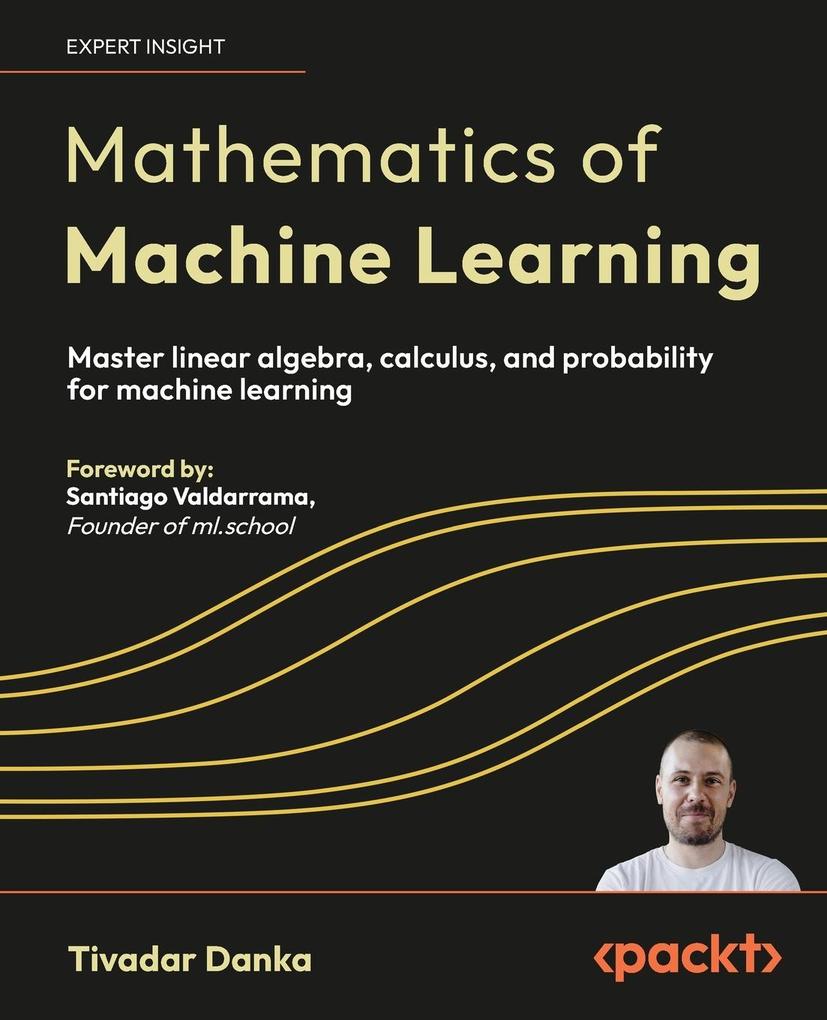
Zustellung: Mi, 25.06. - Mo, 30.06.
Versand in 2 Wochen
VersandkostenfreiBestellen & in Filiale abholen:
Build a solid foundation in the core math behind machine learning algorithms with this comprehensive guide to linear algebra, calculus, and probability, explained through practical Python examples
Purchase of the print or Kindle book includes a free PDF eBook
Key Features:
- Master linear algebra, calculus, and probability theory for ML
- Bridge the gap between theory and real-world applications
- Learn Python implementations of core mathematical concepts
- Purchase of the print or Kindle book includes a free PDF eBook
Book Description:
Mathematics of Machine Learning provides a rigorous yet accessible introduction to the mathematical underpinnings of machine learning, designed for engineers, developers, and data scientists ready to elevate their technical expertise. With this book, you'll explore the core disciplines of linear algebra, calculus, and probability theory essential for mastering advanced machine learning concepts.
PhD mathematician turned ML engineer Tivadar Danka-known for his intuitive teaching style that has attracted 100k+ followers-guides you through complex concepts with clarity, providing the structured guidance you need to deepen your theoretical knowledge and enhance your ability to solve complex machine learning problems. Balancing theory with application, this book offers clear explanations of mathematical constructs and their direct relevance to machine learning tasks. Through practical Python examples, you'll learn to implement and use these ideas in real-world scenarios, such as training machine learning models with gradient descent or working with vectors, matrices, and tensors.
By the end of this book, you'll have gained the confidence to engage with advanced machine learning literature and tailor algorithms to meet specific project requirements.
What You Will Learn:
- Understand core concepts of linear algebra, including matrices, eigenvalues, and decompositions
- Grasp fundamental principles of calculus, including differentiation and integration
- Explore advanced topics in multivariable calculus for optimization in high dimensions
- Master essential probability concepts like distributions, Bayes' theorem, and entropy
- Bring mathematical ideas to life through Python-based implementations
Who this book is for:
This book is for aspiring machine learning engineers, data scientists, software developers, and researchers who want to gain a deeper understanding of the mathematics that drives machine learning. A foundational understanding of algebra and Python, and basic familiarity with machine learning tools are recommended.
Table of Contents
- Vectors and vector spaces
- The geometric structure of vector spaces
- Linear algebra in practice spaces: measuring distances
- Linear transformations
- Matrices and equations
- Eigenvalues and eigenvectors
- Matrix factorizations
- Matrices and graphs
- Functions
- Numbers, sequences, and series
- Topology, limits, and continuity
- Differentiation
- Optimization
- Integration
- Multivariable functions
- Derivatives and gradients
- Optimization in multiple variables
- What is probability?
- Random variables and distributions
- The expected value
- The maximum likelihood estimation
- It's just logic
- The structure of mathematics
- Basics of set theory
- Complex numbers
Purchase of the print or Kindle book includes a free PDF eBook
Key Features:
- Master linear algebra, calculus, and probability theory for ML
- Bridge the gap between theory and real-world applications
- Learn Python implementations of core mathematical concepts
- Purchase of the print or Kindle book includes a free PDF eBook
Book Description:
Mathematics of Machine Learning provides a rigorous yet accessible introduction to the mathematical underpinnings of machine learning, designed for engineers, developers, and data scientists ready to elevate their technical expertise. With this book, you'll explore the core disciplines of linear algebra, calculus, and probability theory essential for mastering advanced machine learning concepts.
PhD mathematician turned ML engineer Tivadar Danka-known for his intuitive teaching style that has attracted 100k+ followers-guides you through complex concepts with clarity, providing the structured guidance you need to deepen your theoretical knowledge and enhance your ability to solve complex machine learning problems. Balancing theory with application, this book offers clear explanations of mathematical constructs and their direct relevance to machine learning tasks. Through practical Python examples, you'll learn to implement and use these ideas in real-world scenarios, such as training machine learning models with gradient descent or working with vectors, matrices, and tensors.
By the end of this book, you'll have gained the confidence to engage with advanced machine learning literature and tailor algorithms to meet specific project requirements.
What You Will Learn:
- Understand core concepts of linear algebra, including matrices, eigenvalues, and decompositions
- Grasp fundamental principles of calculus, including differentiation and integration
- Explore advanced topics in multivariable calculus for optimization in high dimensions
- Master essential probability concepts like distributions, Bayes' theorem, and entropy
- Bring mathematical ideas to life through Python-based implementations
Who this book is for:
This book is for aspiring machine learning engineers, data scientists, software developers, and researchers who want to gain a deeper understanding of the mathematics that drives machine learning. A foundational understanding of algebra and Python, and basic familiarity with machine learning tools are recommended.
Table of Contents
- Vectors and vector spaces
- The geometric structure of vector spaces
- Linear algebra in practice spaces: measuring distances
- Linear transformations
- Matrices and equations
- Eigenvalues and eigenvectors
- Matrix factorizations
- Matrices and graphs
- Functions
- Numbers, sequences, and series
- Topology, limits, and continuity
- Differentiation
- Optimization
- Integration
- Multivariable functions
- Derivatives and gradients
- Optimization in multiple variables
- What is probability?
- Random variables and distributions
- The expected value
- The maximum likelihood estimation
- It's just logic
- The structure of mathematics
- Basics of set theory
- Complex numbers
Produktdetails
Erscheinungsdatum
30. Mai 2025
Sprache
englisch
Seitenanzahl
730
Autor/Autorin
Tivadar Danka
Verlag/Hersteller
Produktart
kartoniert
Gewicht
1234 g
Größe (L/B/H)
235/191/37 mm
ISBN
9781837027873
Bewertungen
0 Bewertungen
Es wurden noch keine Bewertungen abgegeben. Schreiben Sie die erste Bewertung zu "Mathematics of Machine Learning" und helfen Sie damit anderen bei der Kaufentscheidung.









